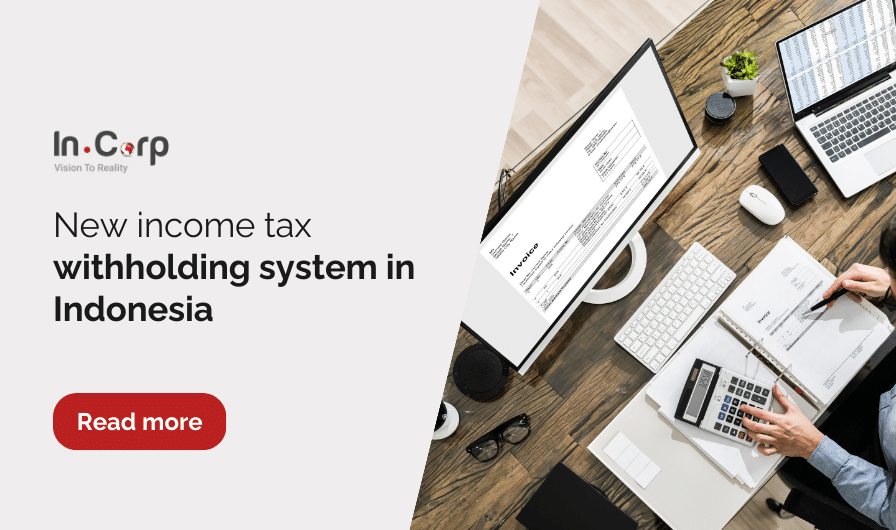Starting January 1, 2024, Indonesian businesses and their employees will switch to a new monthly withholding tax system, per Government Regulation No. 58 of 2023. This new regulation replaces the previous annual calculation with a more straightforward monthly withholding tax system.
This change will directly impact Article 21 (PPh 21) income tax on salaries. The purpose of these changes is to make the withholding tax process more simplified and streamlined for employers and employees alike.
Government Regulation Number 58 Year 2023
There have been some recent changes made to how PPh 21 income tax for employees in Indonesia is calculated, thanks to the introduction of Government Regulation No. 58. To help you better understand what these changes entail, here’s a quick breakdown of the fundamental aspects that have been altered.
Monthly withholding (January-November)
A simplified Effective Tax Rate (ETR) has replaced the traditional progressive tax rate used in monthly calculations. This new ETR is applied directly to the gross income without annualization or deductions.
It already factors in relevant deductions such as non-taxable income, occupational expenses, and pension contributions/expenses. This makes the process of calculating taxes more accessible and more straightforward.
Annual reconciliation (December)
A final yearly calculation uses the standard progressive tax rate to reconcile discrepancies between ETR withholdings and actual tax owed. Any underpayments are collected, and overpayments are refunded.
Read more: A comprehensive guide to value-added tax compliance in Indonesia
What income is taxable in Indonesia?
When determining the taxable income under Article 21 and/or Article 26 about work, services, or activities, the following shall be taken into account for deduction purposes:
| Income category | Types of income |
| Regular and irregular income of employees | Salaries, wages, bonuses, and other forms of compensation |
| Pension income | Regular payments from a pension fund |
| Income of board members and supervisors | Irregular payments |
| Income of temporary employees | Daily, weekly, piecework, and monthly wages |
| Income of freelancers and non-employees | Honorariums, commissions, fees, and other rewards |
| Income of activity participants | Pocket money, representation money, meeting fees, prizes, and similar rewards |
| Partial withdrawals from pension programs | Participants who are still employed |
| Income of former employees | Production service, bonuses, gratuities, and other irregular rewards |
How is net income calculated?
You can subtract the permitted deductions from the gross income to calculate the net income for a Tax Year or a portion.
- Occupational expenses: Costs related to work.
- Pension contributions: Payments made to pension funds or social security programs.
- Zakat or religious donations: Paid through an employer to authorized bodies.
Classification of Effective Tax Rates in Indonesia
Government Regulation No. 58 of 2023 introduces a new system for calculating PPh 21 income tax for individuals in Indonesia. This system uses ETR for monthly and daily income, simplifying calculations and improving cash flow. Let us break it down:
Monthly ETR
To clarify the tax liabilities, we have categorized the monthly income by marital status and income range. Refer to the table below for the specific ETR applicable to your income range and category.
Category A
Category A applies to individuals with the following marital statuses:
- Single with no dependent (S/0)
- Single with one dependent (S/1)
- Married with no dependent (M/0)
Category B
Category B applies to individuals with the following marital statuses:
- Single with two dependents(S/2)
- Single with three dependents (S/3)
- Married with one dependent (M/1)
- Married with two dependents (M/2)
Category C
Category C applies to individuals with the following marital statuses:
- Married with three dependents (M/3)
The full applicable monthly ETR for each income range under each category can be downloaded below.
Daily ETR
This applies to non-permanent employees paid daily/weekly/unit/piece rate.
- 0% ETR for daily income up to IDR 450,000
- 0.5% ETR for daily income above IDR 450,000 up to IDR 2,500,000
The new regulation doesn’t specify ETRs for daily income above IDR 2,500,000.
Who is obligated to pay income tax (PPh 21)?
The new income tax rate for PPh 21 applies to all individual taxpayers earning income from employment, services, or activities in Indonesia. This includes both private sector and public sector employees, encompassing:
- Government officials
- Civil servants
- Members of the Indonesian National Army (TNI)
- Members of the Indonesian National Police (Polri)
- Pensions
How is income tax withheld?
Understanding how income tax is calculated can be a complex task. One important thing to remember is that your income type and marital status determine the amount of income tax withheld from your salary.
By understanding these factors, you can ensure you are taxed accurately and fairly.
| Taxpayer category | Calculation method |
| Permanent employees and pensioners | Calculated using monthly effective rates |
| Board members and supervisors | Calculated using an effective monthly rate |
| Temporary employees | Calculated using different rates based on income and payment frequency |
| Non-employees, activity participants, and others | Calculated using the standard income tax rate |
| Overseas individual taxpayers | Calculated using a 20% withholding or double taxation treaty rate |
Stay mindful of tax and business reporting in Indonesia
To ensure smooth business operations and avoid penalties in Indonesia, individuals and organizations must stay aware of the reporting deadlines and comply with them.
For Individuals
- Annual Income Tax Return: File your individual income tax return by March 31 of the following year. Extensions are available for those with additional income sources or complexities.
For Companies
- Corporate Income Tax (CIT) Return: Submit your company’s annual CIT return by April 30 of the following year for a calendar fiscal year. For other fiscal year-ends, the deadline is the 15th day of the third month following fiscal year-end.
- BPKM Reporting: Companies with foreign investment or in specific sectors must meet periodic reporting deadlines to BPKM, the Investment Coordinating Board. The deadlines vary based on regulations.
Download our calendar for a comprehensive overview of important reporting deadlines in Indonesia.
Tax reporting made easier with InCorp Indonesia
The new monthly withholding system may initially lead to fluctuations in paycheck compared to before. This is because it uses different rates than the traditional annual calculation.
Take the hassle out of salary and PPh 21 calculations by partnering with InCorp Indonesia.
Find out how InCorp Indonesia’s proficient payroll processing and tax reporting services can simplify your company’s payroll administration and calculations. Click the button below for a free consultation.



